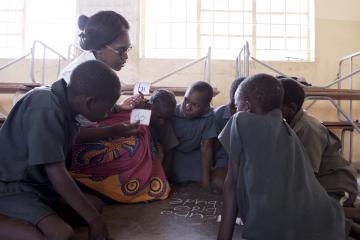
J-PAL Africa Intern Spotlight: Chuka Ezeoguine’s journey pivoting to development economics from engineering

In this post, we speak with Chuka Ezeoguine, a 2021 J-PAL Africa intern who majored in engineering for his undergraduate degree, but had a keen interest in policy and pursued this passion. He talks about the steps he took to pivot to the field of development economics and his strides within our organization as a result.
Can you share a bit about your academic background?
While in high school in Nigeria, I found myself performing very well in my mathematics and core science classes and my economics classes, which I absolutely enjoyed. To pursue my passion, I went to the Federal University of Technology in Owerri, Nigeria for my undergraduate studies and majored in Electronic and Computer Engineering.
Nevertheless, during my time as an undergraduate, I involved myself with other activities that were not necessarily core engineering—including leading the local Data Science Nigeria community at my institution, as I saw the need to give back to students in my institution by sharing my learnings to help grow their technical and problem-solving skills.
When did you realize you were interested in development economics and policy, and what motivated you to take action?
The “aha” moment for me was when I came across the MicroMasters Program in Data, Economics, and Development Policy organized by MIT’s Economics Department and J-PAL. This program fascinated me as it aimed to tackle public policy issues by employing scientific techniques and methods to test hypotheses and ensure that policy decisions are data-driven and evidence-based.
You can imagine the joy on my face when I learned that my interest in the core sciences and the social space was in fact, not the strangest thing—others were interested in the intersection of these topics too. The thought of using my academic passions to make an impact in society and alleviate poverty got me really excited and motivated me to apply to the J-PAL Africa internship program.
Tell us more about your experience with the MicroMasters program.
The MicroMasters program is a fully online program with an optional on-campus component and is accessible to the public. The courses covered various topics including Data Analysis for Social Scientists, Designing and Running Randomized Evaluations, Microeconomics, and the Foundations of Development Policy.
Completing the MicroMasters program also made me eligible to apply to the on-campus full Master’s degree in Data, Economics, and Development Policy at MIT (regardless of my academic background), where these topics would be delved further into with courses ranging from Econometric Data Science, Firms and Markets, Behavioral Economics, and included the opportunity to take an elective class at Harvard University. This sounded exciting because I would get to sit in classes being taught by leaders in the field of development economics, like Esther Dufflo, Abhijit Banerjee, and Joshua Angrist, all of whom are Economics Nobel laureates. I knew I was certainly going to apply to the program.
How did you end up being an intern at J-PAL Africa?
While applying to the Masters program at MIT, I received J-PAL Africa’s email newsletter which called for internship applications. After looking through the role’s description, I thought interning with the team would allow me to apply all I had learned during the online MicroMasters program. I quickly prepared my application and submitted it before the stated deadline. A few weeks later, the J-PAL Africa recruitment team contacted me to attend an online interview, and the rest is history.
Can you share one of your key highlights during your internship with J-PAL Africa?
My story will be incomplete if I do not tell you how excited I was when I learned that I would be working with the Teaching at the Right Level Africa (TaRL Africa) team. I helped analyze the data generated from process monitoring, answered policy questions, and clarified grey areas during program implementation using data while also informing scale-up decisions. I got to share my findings with the TaRL Africa team, and collaborated with and entertained questions from the team. It felt fulfilling to see my inputs being used to help ensure the smooth running of the program.
Beyond contributing my skills, learning from the team was also a major highlight for me. It was insightful to see how data is used to design a program and implement it from start to finish. Being a part of that process is what I loved most.
So what’s next for you?
I was accepted to the MIT Master’s program and arrived at MIT in January 2022. The experience and exposure on campus have been enlightening. I’ve learned a lot from the professors and lecturers here, and I am genuinely grateful to have embarked on this wonderful journey. After the program, I would love to continue working to alleviate poverty and positively impact lives using evidence-driven approaches.
What advice do you have for anyone considering an internship with J-PAL Africa?
Are you still teetering to take that first step and pursue what you truly love? You might, like me, be pivoting from a different field. Don’t worry! If you have the zeal and passion to impact your community using rigorous approaches to inform policies and programs, go for it! Take the bold step, skill up, and get into the space; there is a lot of work to be done, and the world needs your skill set.
Like me, you could become an intern at J-PAL Africa, and this could be a stepping stone to greater heights; I can guarantee that you’d learn a lot from the team. Who knows? With the skills you acquire, you could go on to do great work in development organizations. The sky is just your starting point, and the opportunities and impact you can create are endless in this fantastic field.


